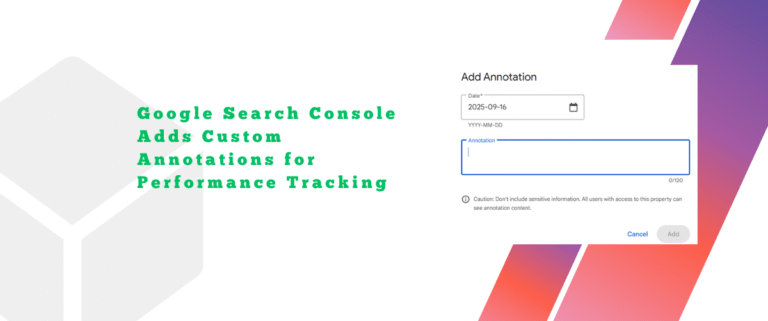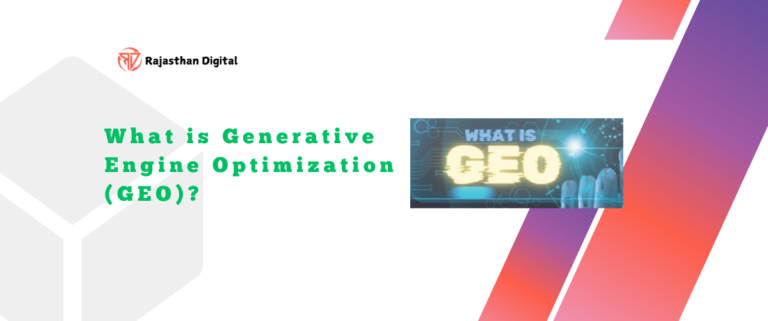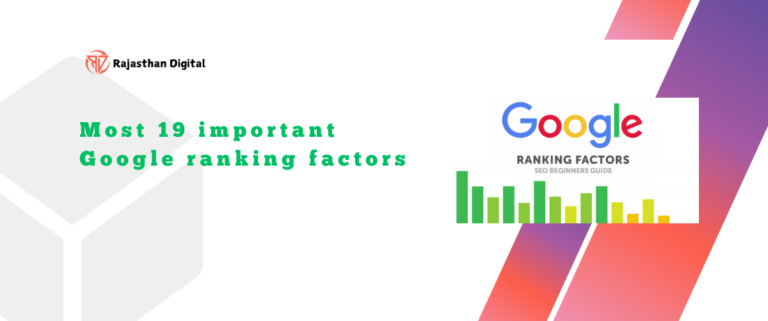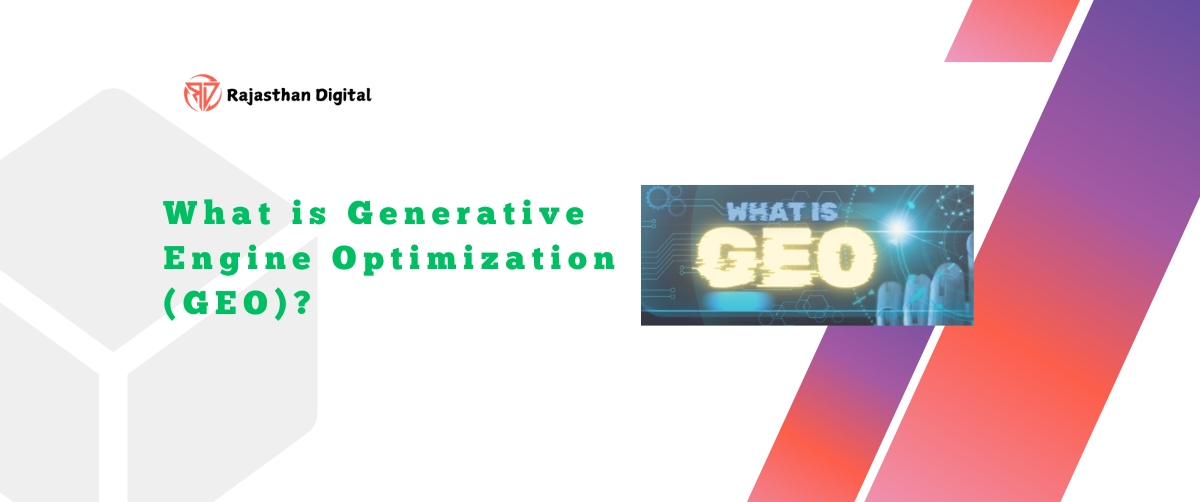As the digital world changes fast, a new trend is emerging. People call this trend Generative Engine Optimization (GEO).
It focuses on online search and content visibility. But what is GEO, and how does it impact your digital presence?
In this blog, we will look at this new idea. We will compare it to traditional SEO. We will also show how businesses can get ready for the future of search with GEO.
What is GEO?
GEO stands for Generative Engine Optimization. It is a modern digital marketing technique focused on optimizing content for generative AI-driven search engines, like Google’s Search Generative Experience (SGE), Bing AI, and others.
Unlike traditional SEO that targets specific keywords to rank web pages higher in search engine results, GEO aims to ensure your content is discoverable, understandable, and useful for AI models that generate summarized answers in search.
In simple terms, generative engine optimization is about writing and structuring your content in a way that it becomes suitable for AI-generated responses.
GEO Define: How GEO Differs from Traditional SEO
Many people wonder: geo vs seo – what’s the difference?
Let’s break it down:
| Aspect | Traditional SEO | Generative Engine Optimization (GEO) |
| Goal | Rank on SERPs | Appear in AI-generated answers |
| Focus | Keywords, backlinks, meta-tags | Clear context, accurate facts, user value |
| Target Audience | Human readers via search results | AI models + human |
| Techniques | On-page & off-page SEO optimisation | Structured, conversational content |
| Search Interface | Static search engine | Generative AI search (e.g., Google SGE) |
So, geo vs seo isn’t really about replacing one with the other. Instead, generative seo complements traditional SEO.
Why GEO Matters in 2025 and Beyond
Generative search is transforming how users interact with search engines. Instead of just links, users now receive quick summaries, insights, and answers generated by AI. That’s why geo search is becoming essential.
Some examples include:
- Google’s Search Generative Experience (SGE) offering AI summaries.
- Bing integrating ChatGPT-like features into search.
- AI assistants like Perplexity AI, You.com, and others reshaping search experience.
To stay visible in these new interfaces, content must be optimized for AI understanding. That’s where generative engine optimisation comes in.
What is Optimized Content in GEO?
To perform well in GEO, your content must be:
- Factual & Reliable: AI prefers accurate data.
- Well-Structured: Use proper headings, bullet points, and summaries.
- Clear & Conversational: Write in a human tone.
- Helpful & Contextual: AI looks for in-depth and relevant information.
- Free of Fluff: AI ignores irrelevant content.
So, what is optimized in the context of GEO? It’s about clarity, usefulness, and formatting.
How GEO Impacts SEO Strategies
Traditional seo optimisation techniques focused on:
- Keyword density
- Backlinks
- Meta descriptions
- Page speed
Now, with geo seo, the focus shifts to:
- Clear intent
- User-focused answers
- Real-world examples
- Updated data
You don’t have to abandon classic SEO. Instead, blend both strategies.
GEO vs SEO: A Combined Approach
Both SEO and GEO matter. Together, they can:
- Increase your visibility in traditional and AI-generated search
- Help your brand be recognized by both search engines and generative engines
- Improve user engagement through more valuable content
The smart move is to optimize for both.
How to Implement Generative Engine Optimization
Here are practical steps to begin with generative seo:
- Answer Questions Clearly: Write content that directly answers common user questions.
- Use Structured Data: Schema markup helps AI understand your content.
- Update Old Content: Ensure it’s fresh, factual, and relevant.
- Use Conversational Language: AI prefers content that sounds human.
- Break Down Complex Ideas: Use headings, lists, and examples.
What Does GEO Stand For in Today’s Digital World?
Today, what does geo stand for is no longer just about geographical location. In digital marketing, GEO now means:
Generative Engine Optimization – a strategy to prepare content for AI-powered search engines.
It’s a mindset shift in how we create and structure digital content.
Search Engine Optimization Trends 2025
GEO is one of the biggest search engine optimization trends today. Other key trends include:
- Voice and conversational search
- AI-powered content recommendations
- Visual search and image-based content
- Personalized and intent-driven content
- Zero-click results powered by AI summaries
Staying ahead of these trends requires adopting GEO.
GEO and Search Generative Experience (SGE)
Google’s Search Generative Experience is the biggest example of how search is changing. Instead of 10 blue links, users get an instant, AI-generated overview.
To show up in this overview, your content must:
- Be comprehensive and accurate
- Reflect real user needs
- Provide clear, concise answers
That’s the heart of geo generative engine optimization.
Conclusion: GEO is the Future of SEO
To explain it simply, Generative Engine Optimization (GEO) is the new way to help your content get noticed by AI search engines. These AI engines look for clear, useful, and well-written information. GEO helps your website appear in these smart search results.
If you write your content in a friendly, helpful, and well-organized way, it will be easier for AI tools like Google’s SGE or Bing AI to understand and show it to users. This doesn’t mean you should stop doing traditional SEO. Instead, GEO and SEO can work together to bring better results.
The future of search is changing fast. With GEO, you can make sure your content stays visible and helpful in this new AI-driven world.
If you want to stay ahead with GEO and digital trends, visit our website: Rajasthan Digital.
Common Questions About GEO
-
What is GEO in digital marketing?
GEO is short for Generative Engine Optimization. It’s the process of preparing your content for generative AI tools in search engines.
-
GEO Define in Simple Words
GEO means creating helpful, understandable, and structured content that AI search engines can pick up easily.
-
Which answer choice accurately explains what a debate is?
While this isn’t directly related to GEO, it’s a good example: A debate is a formal discussion where two or more people present arguments for and against a topic. For GEO, answering this clearly helps AI generate a correct response.
-
Is GEO replacing SEO?
No. GEO is not replacing SEO. Instead, it’s an evolution that works alongside traditional search engine strategies.
-
What is Generative SEO?
Generative SEO (another name for GEO) focuses on creating content that feeds into generative AI responses in search.








